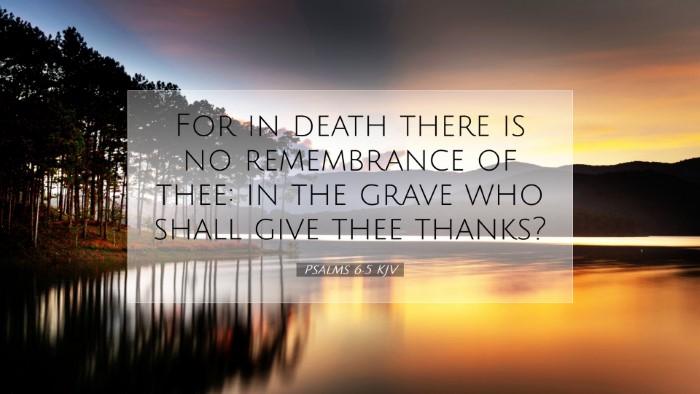Psalms 6:5 Commentary
Bible Verse: "For in death there is no remembrance of thee: in the grave who shall give thee thanks?" (Psalms 6:5, KJV)
Contextual Overview
The sixth psalm is classified as a penitential psalm, conveyed during a time of deep distress. This psalm clearly expresses the psalmist's lamentation, sorrow over sin, and hope for divine mercy. The specific verse in focus, Psalm 6:5, serves as a poignant reminder of the relationship between life, death, remembrance, and worship, encapsulating a fundamental theological concern regarding the afterlife and mortality.
Theological Insights
Understanding Human Mortality
Matthew Henry notes that in this verse, the psalmist underscores the inevitability of death and the limitations it imposes on human memory and praise. There is an inherent urgency to seek God's mercy while there is still breath in the body. The plea implicitly suggests that life provides a unique opportunity for glorifying God through gratitude and worship, a theme that resonates throughout biblical literature.
The Silence of the Grave
Albert Barnes emphasizes that "in the grave" indicates a state where the possibility of praising God ceases. Death marks a definitive boundary where earthly activities and worship come to an end. The psalmist is profoundly aware that once he enters the grave, he loses the capacity to remember God and thank Him for His innumerable blessings. This thought amplifies the urgency for repentance and divine assistance in the present.
The Human Condition
Adam Clarke adds that the psalmist's reflection on death serves as a sober reminder of human frailty and dependence on God's grace. Clarke notes that this meditation on mortality is no pessimistic resignation to fate but a heartfelt call for divine intervention while life is still a reality. The psalmist recognizes a vibrant relationship with God must be actively nurtured in life, as death leads to perpetual silence.
Literary Structure and Style
This verse employs both metaphorical and literal dimensions to convey its message. The metaphor of death and the grave serves as a depiction of the ultimate cessation of human activities, juxtaposed against the vibrant act of giving thanks to God. The rhetorical questions presented point towards the understanding of worship as intrinsic to the human experience, urging believers to utilize their time on earth wisely.
Application for Believers
As pastors and theologians reflect upon this verse, several practical implications arise:
- Urgency of Worship: Believers are called to actively engage in worship and gratitude during their lifetime, recognizing that earthly opportunities are fleeting.
- Reverence for Life: The acknowledgment of death should lead to a heightened reverence for life—and the life lived in the presence of God should be one filled with thanksgiving and praise.
- Call to Repentance: This verse serves as a wake-up call for self-examination; recognizing sin and seeking God’s mercy is paramount while one has the chance.
Reflections on Mortality and Divine Relationship
The silent graves underline the importance of actively fostering a relationship with God in the here and now. The psalmist urges all to engage in acts of thanksgiving and remembrance, reinforcing the belief that life is a gift—meant to be dedicated to honoring God. The text invites believers to live actively within God's grace, acknowledging the brevity of life and the significance of divine mercy.
Conclusion
Psalms 6:5 challenges believers to confront the realities of life and death, urging a profound sense of urgency in the pursuit of a relationship with God characterized by repentance and thankfulness. It serves a dual purpose: a reminder of human limitations and a call to embrace the grace available through Christ. It reaffirms the belief that worship during our lifetime has eternal significance, stressing that before the final onset of death, we must recognize and honor the God who grants us life.


